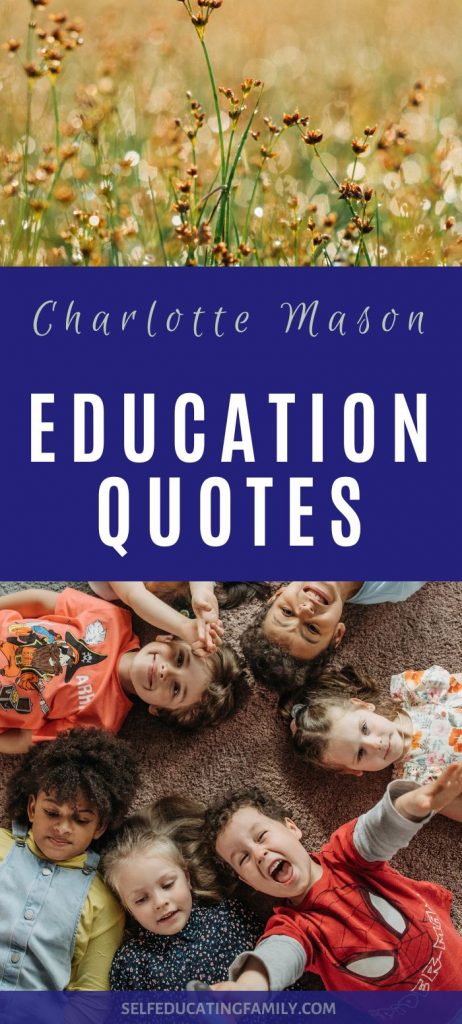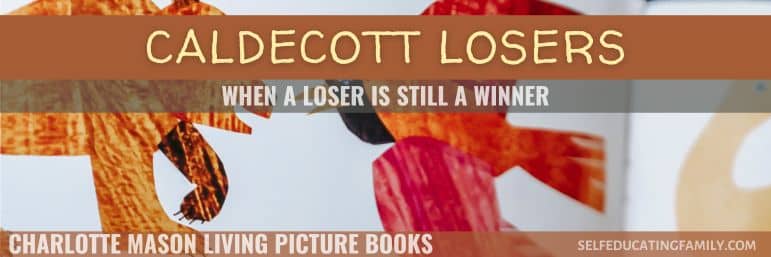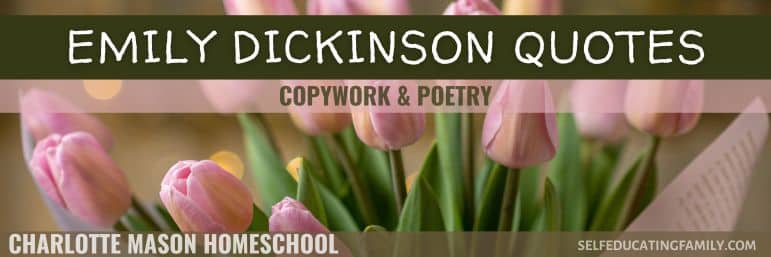What’s Inside: Charlotte Mason quotes: She had much to say about a philosophy of education! Here are some favorite inspirational quotes which will help you steer the education of our children.
This post may contain affiliate links. If you find my content valuable and make a purchase through one of my links, I will earn a commission at no cost to you, which helps me keep this blog going so I can help you even more! I recommend products I trust and/or use myself, and all opinions I express are my own. Read the full disclaimer here.
Charlotte Mason Quotes for Education
Charlotte Mason (CM), a turn of the 20th century educator, had much to say about a philosophy of education. We’ll look at some of my favorite Charlotte Mason quotes to see how this relates to how we can help steer the education of our children. This post is dedicated to the parents and educators who delight in their children’s learning.
Education is…
Charlotte Mason (1842-1923) promoted the idea that “Education is an atmosphere, a discipline, a life.” As an educator, she guided children and then other teachers as she formed her philosophy of education. In addition to authoring a series of geography books in the 1880s called the Ambleside Geography Books, Miss Mason went on to write a six-volume set on The Original Homeschooling Series over a period of forty years. Her principles continue to strike a chord with parents and educators today.
Many aspects of her philosophy caught my eye early in my family’s personal journey in child-rearing. In particular, the concept of “short and varied lessons with full attention” appealed to me with my three active boys. From ages 6-9, my boys certainly appreciated SHORT lessons and moving on to something else quickly. They also enjoyed quick breaks when moving between lessons.
As I now stand at end of one chapter of my role as a parent and home educator with my oldest boys beginning to leave the nest, I would like to share some thoughts on Charlotte Mason’s more intriguing quotes.
In some respects, I’ve written this as a form of my own commonplace book with only Charlotte Mason quotes, but primarily I want to encourage other parents and teachers toward the lofty ideas that Miss Mason presents. She definitely looked toward the big picture. I have picked out some of her best sayings – the ones that inspire me the most. I humbly hope that they encourage you as well.
What is the purpose of Education?
Our aim in education is to give a full life. We owe it to them to initiate an immense number of interests. Life should be all living, and not merely a tedious passing of time; not all doing or all feeling or all thinking – the strain would be too great – but, all living; that is to say, we should be in touch wherever we go, whatever we hear, whatever we see, with some manner of vital interest.
—Volume 3, p. 171

One of our goals as parents is to help our children grow up towards a fulfilling life.
How do we do this? Susan Shafer from Simply Charlotte Mason quotes CM’s comment on the mother’s role in their child’s education:
“She [The mother] must ask herself seriously, Why must the children learn at all? What should they learn? And, How should they learn it? If she take the trouble to find a definite and thoughtful answer to each of these three queries, she will be in a position to direct her children’s studies”.
—Volume 1, p. 171
Introduction of Great Ideas
In asking these questions, we come to the purpose of education and growing critical thinkers.
Thought breeds thought; children familiar with great thoughts take as naturally to thinking for themselves as the well-nourished body takes to growing; and we must bear in mind that growth, physical, intellectual, moral, spiritual, is the sole end of education.
Charlotte Mason
Reference notes
For brevity of referencing: All quotes are from the six volumes of The Original Homeschooling Series unless noted:
- Volume 1: Home Education
- Volume 2: Parents and Children
- Volume 3: School Education
- Volume 4: Ourselves
- Volume 5: Formation of Character
- Volume 6: Towards a Philosophy of Education
I will simply refer to the Volume number and page number in the quotes below.
Note: If you want a shorter introduction to Charlotte Mason’s methods, I recommend Karen Andreola’s A Charlotte Mason Companion.
Self-Education
“Self-education is the only possible education; the rest is mere veneer laid on the surface of a child’s nature.”
—Volume 6, p. 240
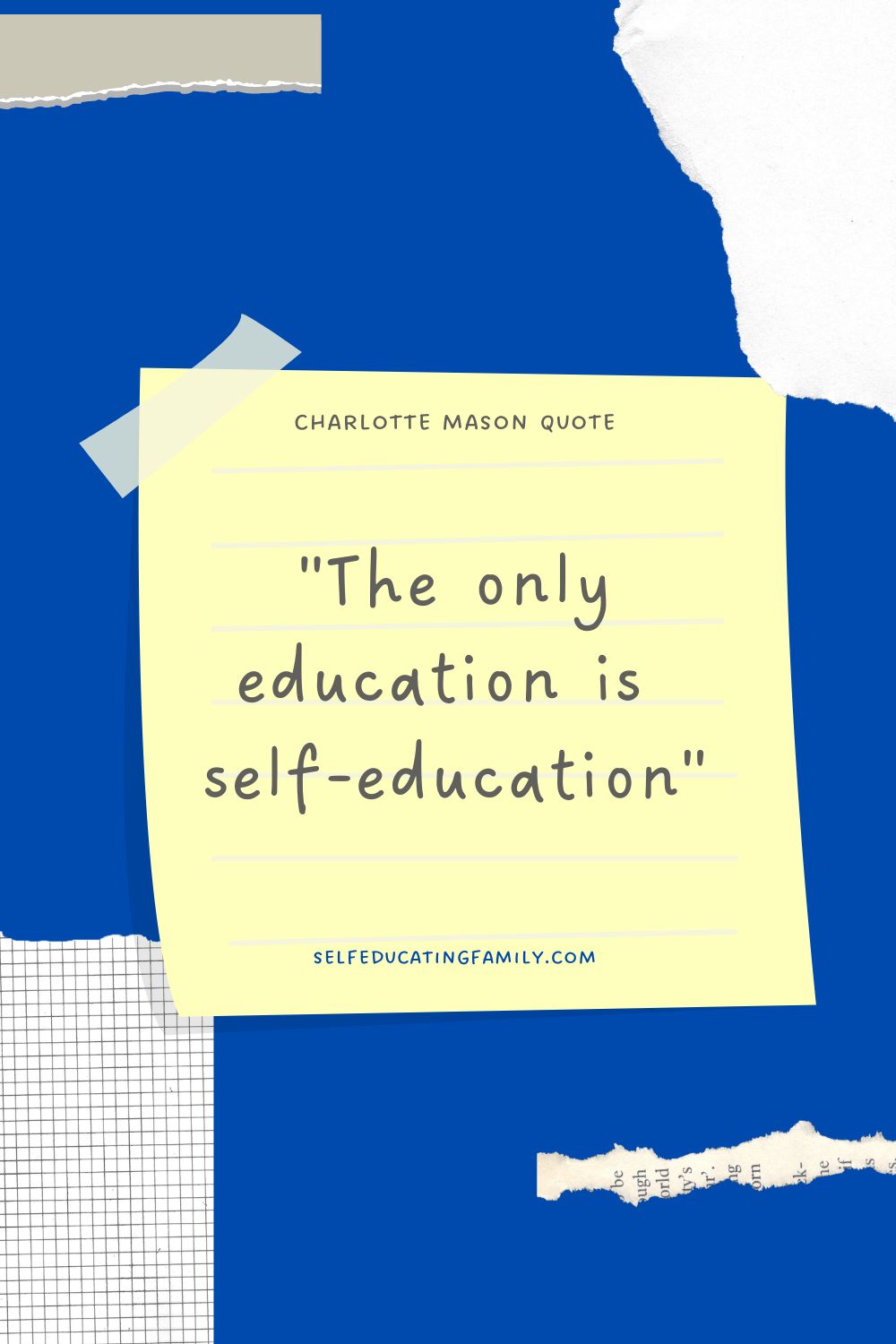
Here, CM is talking about the doing part of education. The knowledge can’t really be gained, that is, incorporated into someone, unless that person takes it upon himself to do something with the knowledge, similar to digesting food. You feed your child, not just so they can fill their stomachs and poop it out, but so that they can grow into a healthy mature adult. It’s the parent’s responsibility to provide quality food, and the child’s responsibility to exercise mind and body. With education, the knowledge has to be “transformed” and “absorbed” by the individual in order to produce what she calls vitality.
This saying keeps me balanced. While it usually feels great to check off the list of “things that my kids need to finish for homeschooling them,” CM always brings me back to the important issues, like: are they learning to love learning on their own?
Take away: The goal is a child who makes the self-effort to become educated.
TIP! Don’t lecture when you teach
I think we owe it to children to let them dig their knowledge, of whatever subject, for themselves out of the “fit” book; and this for two reasons: What a child digs for is his own possession; what is poured into his ear, like the idle song of a pleasant singer, floats out as lightly as it came in, and is rarely assimilated. I do not mean to say that the lecture and the oral lesson are without their uses; but these uses are, to give impulse and to order knowledge; and not to convey knowledge…
—Volume 3, p. 178 from “Principles on which to select School-books.“
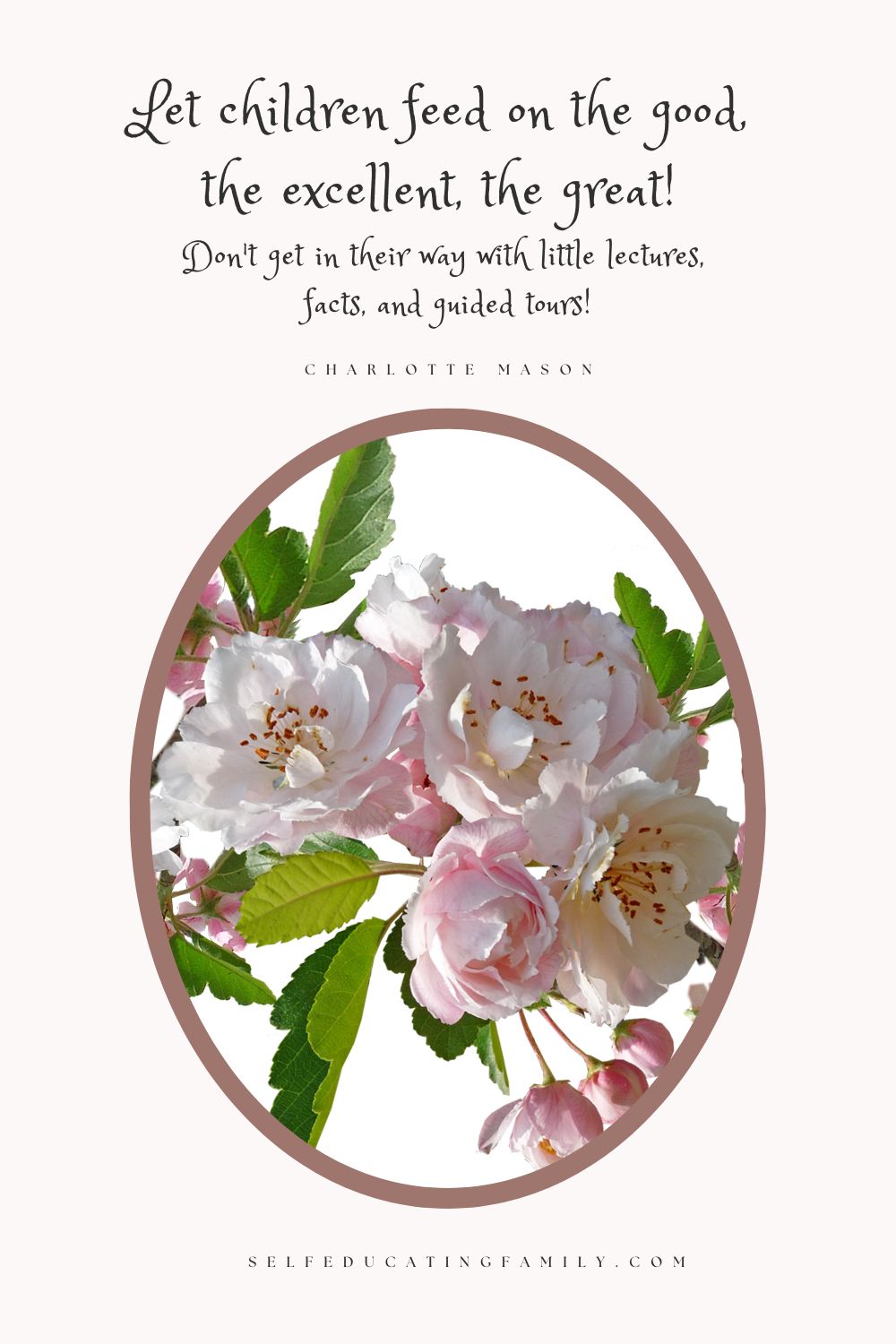
Less is more
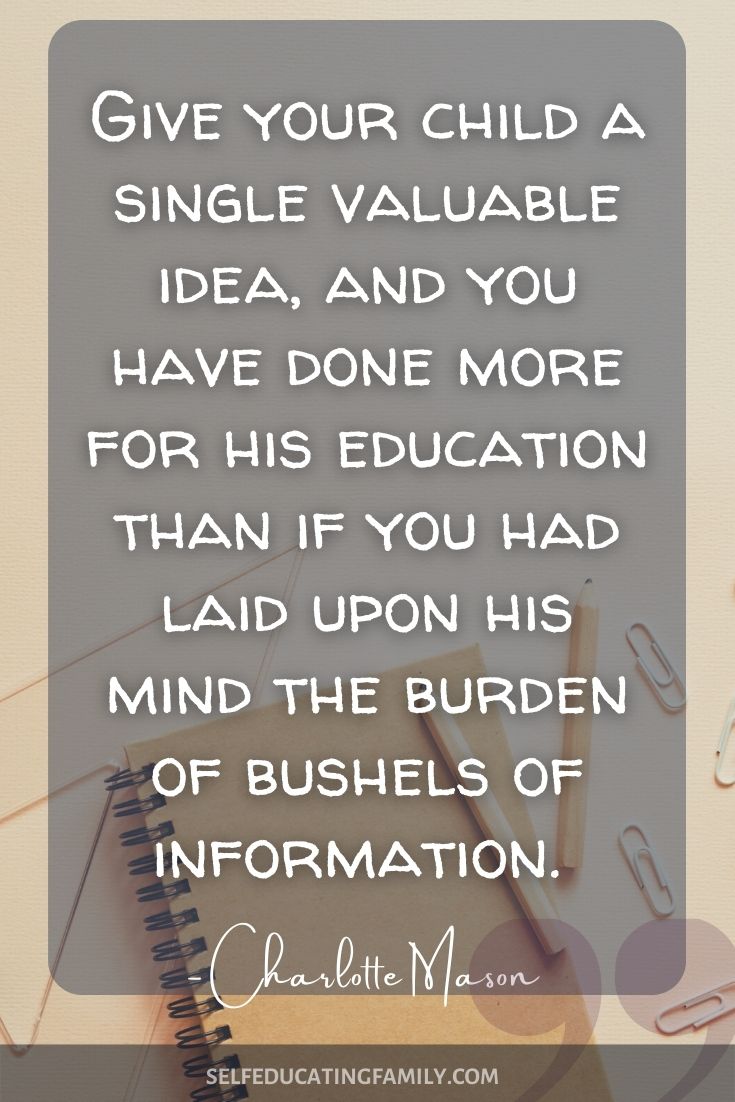
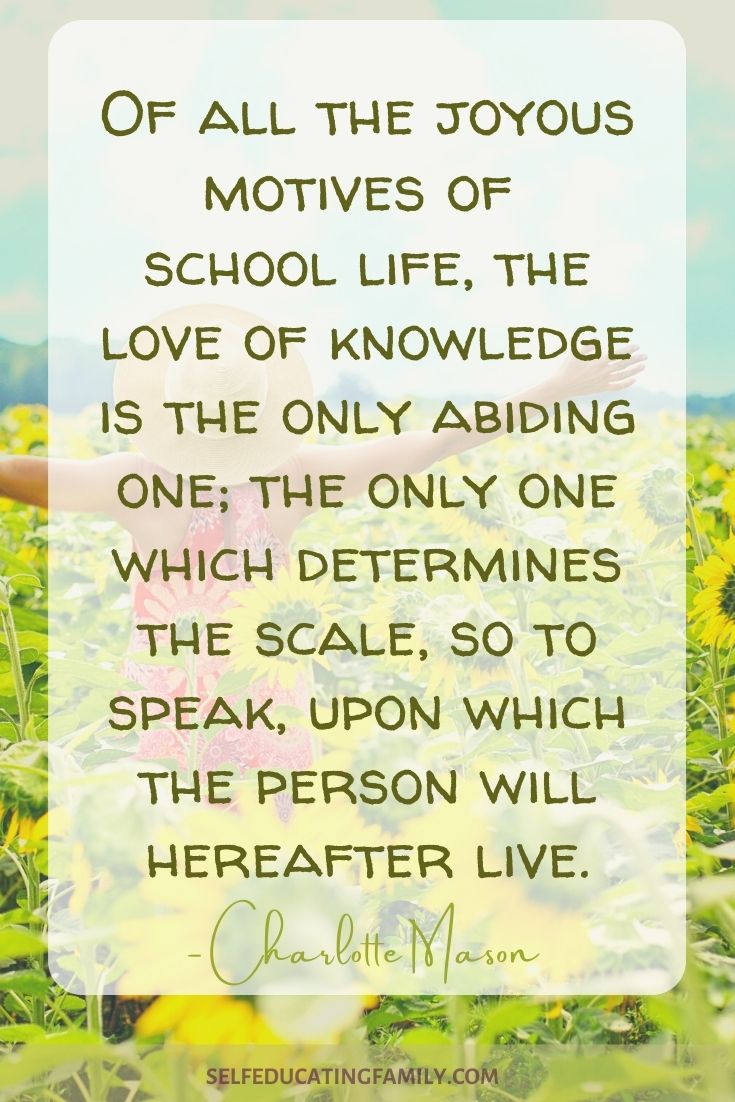
Let them get at the books themselves, and do not let them be flooded with diluted talk from the lips of their teacher. The less the parents ‘talk-in’ and expound their rations of knowledge and thought to the children they are educating, the better for the children…Children must be allowed to ruminate, must be left alone with their own thoughts.
—Volume 3, p. 163 from “A Wider Curriculum“
Living Books
To introduce children to literature is to install them in a very rich and glorious kingdom, to bring a continual holiday to their doors, to lay before them a feast exquisitely served. But they must learn to know literature by being familiar with it from the very first.
—Volume 6, p. 52
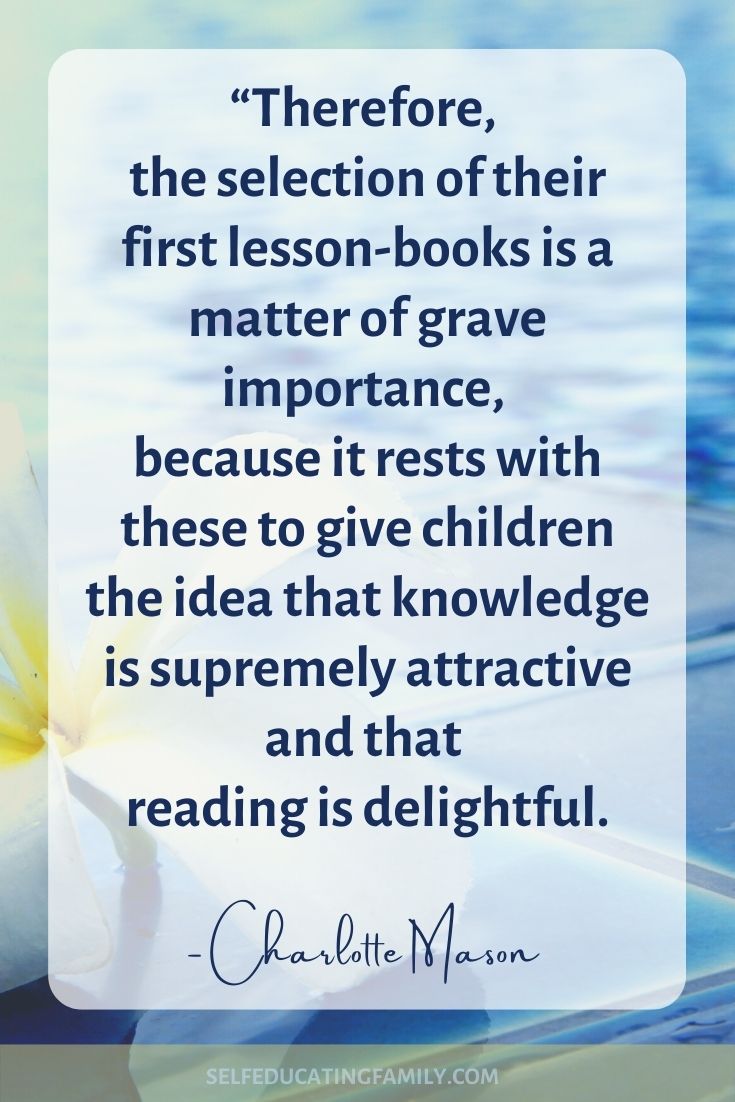
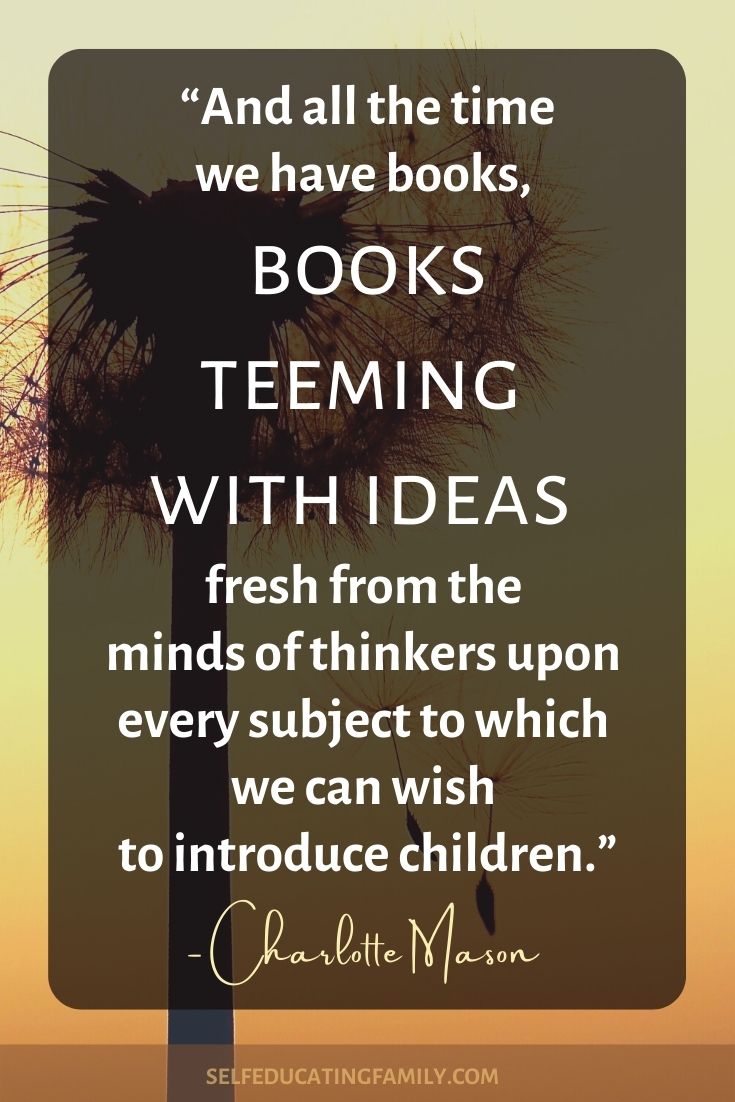
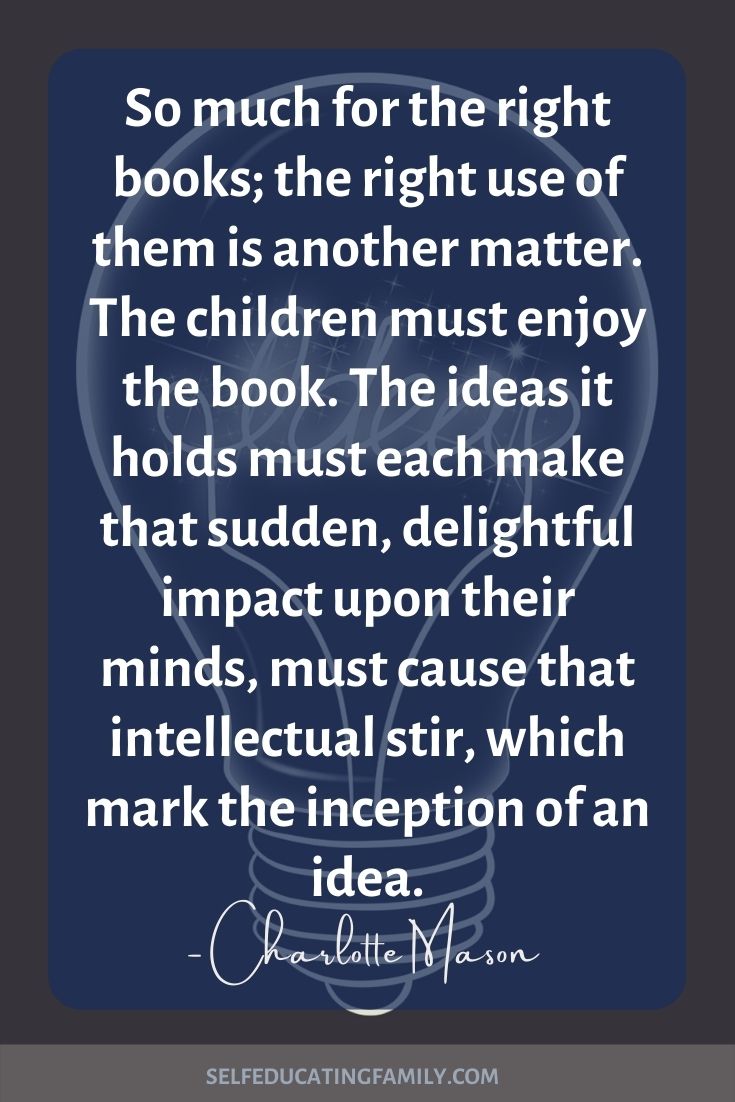
“One more thing is of vital importance; children must have books, living books; the best are not too good for them; anything less than the best is not good enough;and if it is needful to exercise economy, let go everything that belongs to soft and luxurious living before letting go the duty of supplying the books, and the frequent changes of books, which are necessary for the constant stimulation of the child’s intellectual life.”
—Volume 2, p. 280 from “Children must have the Best Books“
Living Books vs. “twaddle”
We have never been so rich in books. But there has never been a generation when there is so much twaddle in print for children.
—Charlotte Mason
Definition of Twaddle
Twaddle, according to Merriam Webster, is silly idle talk or something insignificant or worthless.
Merriam Webster
I laugh every time I read this! It’s hard to imagine that Miss Mason lived over a century ago and said there was too much “twaddle” then! The amount of books constantly being created now in our-info-tech world staggers the mind. Compared to yesteryear, how many of today’s books are “twaddle”?
I remember being at a library story time when my boys were young and the reader selected a book where most of the words in the book were “NO!” I couldn’t imagine why an author would write such nonsense.
Or why a parent would want to teach their child to say no.
I had twins. Did you know that twins hear the exclamation “No!” more than twice as often as a singleton child?
I think people need more positivity. They’ll get enough “No’s” in their time.
More Twaddle
Charlotte had more to say about twaddle:
Even for their earliest reading lessons, it is unnecessary to put twaddle into the hands of children.
– Volume 1, page 205
There’s an element of too-little-time-to-waste-with-twaddle in CM’s view.
At the same time, when there is so much noble poetry within a child’s compass, the pity of it, that he should be allowed to learn twaddle!
– Volume 1, p. 226
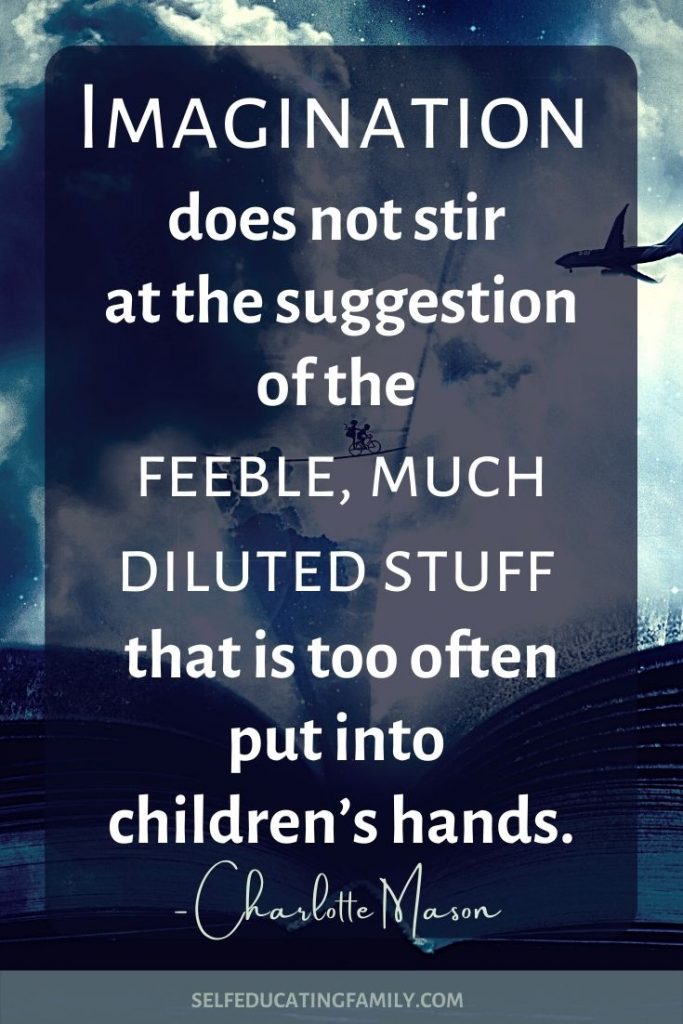
Twaddle in Lesson Books
Miss Mason makes a distinction between living books and poorly written lesson-books:
A child has not begun his education until he has acquired the habit of reading to himself, with interest and pleasure, books fully on a level with his intelligence. I am speaking now of his lesson-books, which are all too apt to be written in a style of insufferable twaddle, probably because they are written by persons who have never chanced to meet a child.
– Volume 1, p. 229
Back to the premise
Her ideas also go right back to that first principle of a CM education: that children are born persons. Look at the respect she shows for the children by nurturing them with the best.
Children must be Nurtured on the Best––For the children? They must grow up upon the best. There must never be a period in their lives when they are allowed to read or listen to twaddle or reading-made-easy. There is never a time when they are unequal to worthy thoughts, well put; inspiring tales, well told.
—Volume 2, p. 263
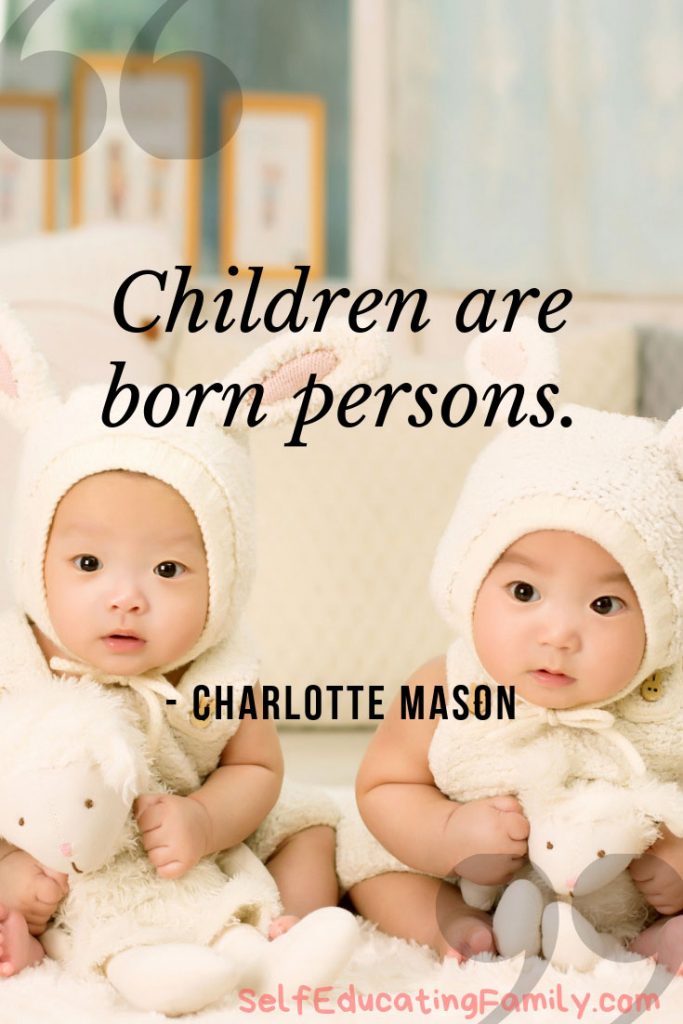
No need to mollycoddle
CM believed that the child most likely could handle literary works that are normally considered “above their grade level”.
Children have no natural appetite for twaddle, and a special literature for children is probably far less necessary than the book sellers would have us suppose. Out of any list of ‘the hundred best books,’ I believe that seventy-five would be well within the range of children of eight or nine.
—Volume 3, p 122
She brings a question to the table––What manner of book will find its way with upheaving effect into the mind of an intelligent boy or girl?
Just because a child *likes* “goody-goody story books” or “highly spiced tales of adventure” – doesn’t mean they can’t do better. And the reason we should want to have better quality books is that we are designed for a higher purpose.
We are all capable of liking mental food of a poor quality and a titillating nature; and possibly such food is good for us when our minds are in need of an elbow-chair; but our spiritual life is sustained on other stuff, whether we be boys or girls, men or women. By spiritual I mean that which is not corporeal; and which, for convenience sake, we call by various names––the life of thought, the life of feeling, the life of the soul.
Volume 3, p 169
Inspiration to read better books!
Reading these ideas inspires me to want to read better books! And it helped me encourage my kids to read living books.
You may also like:
